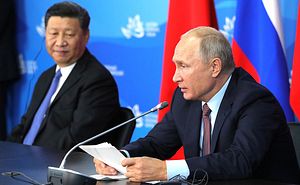Last week saw Russia joining hands with China to conduct its largest military exercises since the Soviet era. Chinese President Xi Jinping was in Russia as well to attend the Eastern Economic Forum in Vladivostok and he bonded with Russian President Vladimir Putin over pancakes, caviar, and shots of vodka. They were sending messages to multiple audiences: to those back home in Russia and China as the two leaders use military nationalism to consolidate their positions at home and then to the West and the U.S. in particular that two major powers are seemingly joining hands.
The Russian Defense Ministry claimed that some 300,000 soldiers were involved in all stages of the five-day-long Vostok 2018 exercise, which involved helicopter and parachute landings by Russian infantry forces. Though Russian and Chinese forces have exercised together before in multinational drills, mostly under the auspices of the Shanghai Cooperation Organization, the inclusion of 3,200 Chinese troops, along with 30 aircraft, into the Russian military maneuvers gives these exercises an altogether new dimension. Where last year’s major exercise, Zapad 2017, was focused on Russia’s western frontier with NATO, in a sign of changing times this year’s drills saw Russia and China exercising together in a region not far from where China and the USSR fought a real border war in 1969.
The United States, of course, would have watched closely as the exercise came months after the Trump administration unveiled its new national defense strategy that underlines “strategic competition” with Russia and China, and as its ties with both countries have deteriorated under spiraling sanctions. U.S. Defense Secretary Jim Mattis dismissed these drills, saying, “I see little in the long term that aligns Russia and China.”
For his part, Putin justified these exercises by underscoring Russia’s credentials as “a peace loving country” that was ready to defend itself. “Our duty to our country, our Motherland, is to be ready to defend its sovereignty, security and national interests of our country, and if necessary to support our allies,” he said in his address.
China has today emerged an important partner for Russia despite continuing differences in certain areas. As Russia’s ties with the West have deteriorated, it has moved remarkably closer to China with trade and military cooperation between the two flourishing, something unthinkable just a few years ago. Chinese investment in Russia is growing too. Russia is China’s largest oil supplier, and is likely to emerge as its biggest source of natural gas in a year’s time. At a time when Russia’s trade ties with most nations are on a downward trajectory, China is a rare bright spot.
For China, meanwhile, there is much to learn from Russia’s operational experience in war fighting. Though China’s military modernization will leave Russia far behind, its real-time operational experience is rather limited. Russia’s experience in the Syrian conflict, where it has sharpened its information warfare and combined armed warfare techniques, is something that Chinese military generals are eyeing with great interest. As Major General Shao Yuanming, deputy chief of the Joint Staff Department of China’s Central Military Commission, made clear during the Vostok 2018 drills: “The Russian Army has a very vast experience in conducting practical combat operations and powerful combat capability,” and “for us it’s been very useful to learn from the Russian army and get this very valuable experience.”
By involving China in its exercises in the Far East, Russia has indicated that it doesn’t see Beijing as a short- to medium-term threat in the region, something that was quite palpable just a few years ago. The two may not be allies yet but their relationship has grown to an extent that such exercises are possible and a relationship can be developed to take on the United States together.
There are clear limits to this partnership. Both Russia and China are also independently trying to frame their responses to the Trump administration. China’s primary interest is in stabilizing its economic relations with the United States at a time when its economy is beginning to face the adverse effects of tariffs. It has little interest in expanding the ambit of its disputes with the United States by supporting Russia on its confrontation with NATO. Russia too is cognizant of the limits of its power. It is the junior partner in this Sino-Russian entente and would want limited exposure to the South China Sea dispute, for example.
But to look at the Sino-Russian relationship primarily through the prism of its limitations is to miss the point altogether. The fact that this relationship has grown to this extent where the two are now participating in joint military exercises underscores the rapidly evolving nature of this relationship. Both are now more unified than ever in posing a challenge to the U.S.-led global order.
For India, this poses a real challenge. New Delhi has long maintained that it needs a close relationship with Moscow so that the Beijing-Moscow relationship could be dented. But India’s Russia outreach seems to have had a rather insignificant impact so far on the Russia-China dynamic. Russia is also reaching out to Pakistan despite Indian reservations and is changing its tune on the Afghanistan issue. It is now a strong votary of negotiating with the Taliban and has given short shrift to Indian reservations in this regard. Russia has been at the forefont of advising India not to challenge China’s ambitious Belt and Road Initiative (BRI). Given the challenge China poses to India on multiple fronts, this growing Sino-Russian collusion should ideally be at the top of the agenda when the Russian president visits India next month.

































